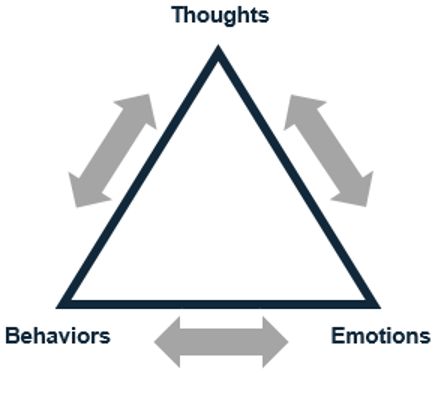Can CBT Therapy help with anxiety symptoms?

If you’ve been wrestling with severe anxiety symptoms for any length of time, then you know firsthand how difficult these experiences can make everyday living. Whether it’s restlessness or increased irritability, you may be at the point where you’re looking for some help in managing your anxiety. In your search for a licensed professional to help you, you may have run across the term “CBT.” If you’re wondering what CBT is and how it will help your anxiety, you’re in the right place. While this article is not exhaustive, I hope it gives you more information about this form of treatment and more importantly, how CBT can help decrease some of your anxiety symptoms.
What is CBT?
Cognitive Behavioral Therapy (CBT) is an approach that draws connections between our thoughts, feelings, and behaviors. CBT operates under the assumption that what we think influences our emotions and our emotions influence our actions.

Image from VA counseling (https://www.vacounseling.com/cbt-triangle/)
In the diagram above, you can see the connection between our thoughts, emotions, and behaviors. According to David Clark and Aaron Beck, the writers of The Anxiety and Worry Workbook, The Cognitive Behavioral Solution, “The goal of cognitive therapy is to deactivate, or turn off, the fear program and return you to a normal state of functioning. This is achieved by transforming or changing your anxious thoughts and beliefs.” A therapist utilizing CBT techniques will emphasize identifying specific thought patterns, which may lead to distressing emotions and destructive behavior. Our trained professionals at SEVN Therapy Co. may help you manage the source of anxious thoughts through the CBT framework.
So now that you understand a little about Cognitive Behavioral Therapy, how can it help with your anxiety symptoms? CBT can help improve anxiety symptoms in a few ways:
CBT can help Identify cognitive distortions that lead to feelings of anxiety.
Cognitive distortions are skewed lenses that “distort” how we view neutral situations. These “thought” distortions lead to feelings of anxiety that can manifest into physical anxiety symptoms. I like to describe cognitive distortions as lenses or glasses that we put on that warp our view of what’s going on. Cognitive behavioral therapy helps us ‘remove’ those glasses and see the situation or the person for who they are. David Clark and Aaron Beck write, “The problem with anxiety disorders is that people tend to overestimate both the likelihood and the intensity of threat and danger.” By identifying these “glasses,” we can more easily recognize when they are on and remove them.
CBT incorporates homework exercises to help improve anxiety symptoms in a timely manner.
Cognitive Behavioral Therapy thrives on homework. The work we do in therapy is only as good as the work we do outside of therapy. In fact, “Research studies have shown that individuals who engage in homework assignments between cognitive therapy sessions experience greater improvements in anxiety or depression than individuals who don’t.[1]” Applying the concepts learned during the therapy session gives you the confidence to adopt these practices as a way of life. I am aware some clients may not like the idea of homework. Consider this: Compare 5 minutes of therapy homework each day to the hours you spend struggling with anxiety. There’s really no comparison that homework is essential for therapeutic growth.
CBT is a rich and powerful method to help you understand and manage your anxiety symptoms. Experts have taught classes and written books on this subject. Finding a trained therapist utilizing cognitive behavioral therapy in sessions could be the difference between struggling with anxiety and finally managing your anxiety symptoms in a healthy way. Feel free to call 817-778-0522 or schedule an intake session with me so that we can further discuss a unique treatment plan to work through your anxiety symptoms and experience.
[1] The Anxiety and Worry Workbook: The Cognitive Behavioral Solution by David A. Clark and Aaron T. Beck

Alicia Williams, LPC-Associate
Supervised by Erin James, LPC-S



